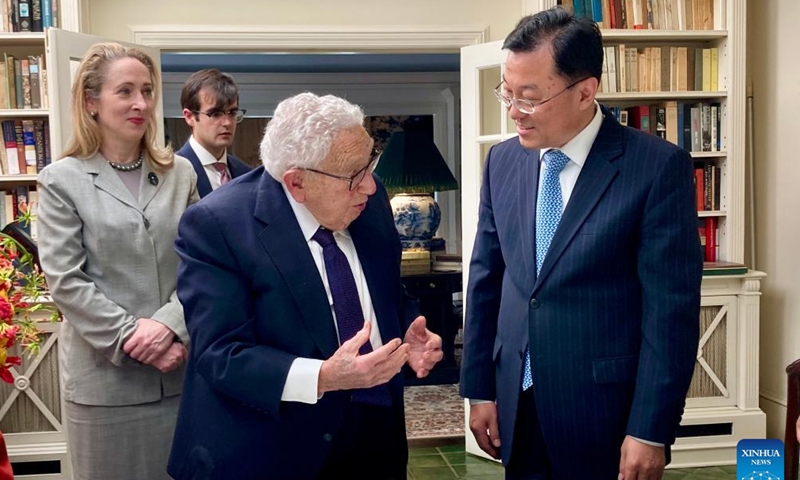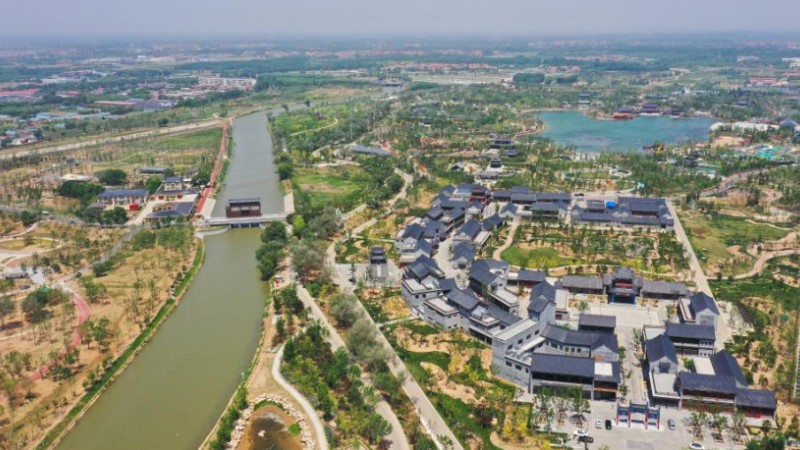At 100, Kissinger still razor-sharp on China-US relations

Chinese Ambassador to the United States Xie Feng meets with former U.S. Secretary of State Henry Kissinger in Kent, Connecticut, the United States, May 26, 2023. Xie Feng on Friday met with Kissinger in Kent, Connecticut, expressing best wishes from the Chinese side to Dr. Kissinger on his 100th birthday. The pair had an in-depth exchange of views on China-U.S. relations and international and regional issues of common interest. (Xinhua)
Henry Kissinger, who turned 100 on Saturday (US local time), still keeps his great mind razor-sharp on US-China relations by explicitly warning Washington to "refrain from being heedlessly adversarial and pursue dialogue instead" for the sake of humanity. However, Chinese analysts told the Global Times on Sunday that they are pessimistic that current Biden government's policymakers will heed the wise words from the legendary centenarian.
Chinese Ambassador to the US, Xie Feng, met with former US secretary of state in Kent, Connecticut on Friday, expressing best wishes from the Chinese side to Kissinger on his 100th birthday, according to the Chinese Foreign Ministry. The two sides had an in-depth exchange of views on China-US relations and international and regional issues of common interest.
Starting as a scholar of 19th-century diplomacy, then becoming America's national security adviser and secretary of state, and serving for the past 46 years as a consultant and emissary to monarchs, presidents and prime ministers, Kissinger has been hailed by many as having more experience in international affairs than anyone alive.
"Kissinger has made great contributions to China-US relations, which can be seen as one of his career highlights, under the principle of putting aside ideological differences and handling China relations based on reality and respect with an emphasis on equality," Li Haidong, a professor at the China Foreign Affairs University, told the Global Times on Sunday.
Before turning 100, Kissinger had interviews with media outlets including The Economist and the Wall Street Journal, urging the US "to refrain from being heedlessly adversarial and pursue dialogue instead."
Speaking recently with The Economist, Kissinger said he is alarmed by China's and America's intensifying competition for technological and economic pre-eminence. "We're in the classic pre-world war one situation," he says, "where neither side has much margin of political concession and in which any disturbance of the equilibrium can lead to catastrophic consequences." The new centenarian also warned against misinterpreting China's ambitions.
During his interview with the WSJ, which was published on Friday, Kissinger said that "to prevent war with China, the US needs to refrain from being heedlessly adversarial and pursue dialogue instead."
Stressing realism instead of ideology and emphasizing equilibrium are the two most significant characteristics of Kissinger's diplomatic approach, which stemmed from his life experience in World War II, the most devastating and violent period in human history, and his understanding from the period that people always pay much more than what they ever gain from wars, Lü Xiang, research fellow at the Chinese Academy of Social Sciences, told the Global Times.
However, Lü noted that both former US president Donald Trump and the current US leader Joe Biden, a Cold War warrior, can hardly understand this, and the White House has shown a tendency of abusing the concept of national security when it comes to dealing with business competition with China.
Lü cited the case of Huawei and TikTok facing reckless suppression in the US, saying that some US companies are using their voices inside the US congress to attack Chinese competitors in the name of national security.
Chinese analysts are cautious and even pessimistic about whether the Biden administration will turn around its excessive antagonism to China or its aggressive China approach, despite signs of increasingly frequent official interactions.
Chinese Commerce Minister Wang Wentao met with US Trade Representative Katherine Tai on Friday on the sidelines of the two-day 2023 APEC Ministers Responsible for Trade Meeting. The two sides had "candid, pragmatic and in-depth" exchanges on the China-US economic and trade relationship, as well as regional and multilateral issues of common concern, according to Xinhua News Agency. Wang also met with US Commerce Secretary Gina Raimondo in Washington on Thursday.
Ambassador Xie Feng, a former vice foreign minister who is widely known as a specialist in US affairs due to his vast experience in the field over the past decades, arrived in New York on Tuesday to assume his post. Some Chinese experts believe that the filling of the Chinese ambassador vacancy is a sign of more progress in the recent resumption of high-level re-engagements between Beijing and Washington.
Before that, following the recent Group of Seven summit and Quad meeting that outlined a strong stance against China and ramped up efforts to hype China-related issues, US President Joe Biden adopted a relatively softer tone by claiming that the frosty bilateral relations between China and the US will begin to "thaw" very shortly.
High ranking US officials such as Secretary of State Antony Blinken also hinted that he hoped to make a trip to China in the near future.
We can tell there are some adjustments in the US' China strategy from these signs, and it is by no means certain that such adjustments can be sustained in the long run, Li said, noting that since the Biden government's diplomacy is deeply influenced by the domestic political atmosphere and considering that the 2024 presidential election season has already begun… the nature of the US' China policy will not see radical change in the long run.
May 26 also marked the first anniversary of the Biden government's announcement of its China approach. Blinken said in his testimony at the Senate Appropriations Committee hearing on US-China Competition on May 16 last year, "I set out the Administration's comprehensive PRC strategy to 'invest, align, compete.'
We've made historic investments at home - including the bipartisan infrastructure law, CHIPS and Science Act, and Inflation Reduction Act - to strengthen our ability to compete. We've aligned our approach with key partners in Europe, Asia, and beyond, working methodically to elevate our engagement around the world - and as a result, have achieved greater convergence to deal with the challenges China poses than ever before."
The US' leaders and policymakers have been haunted by self-deception, confusing American selfishness with global interests, a stark contrast to Kissinger's proposition on China-US relations. The current so-called high-level engagements with China are not constructive, as they believe all US requests are righteous and that China must make concessions to their terms, rather than seek a solution based on an equal footing, so China will reject it, Lü said.
Photos
Related Stories
- Chinese ambassador to U.S. meets with Henry Kissinger
- Chinese commerce minister meets with U.S. trade representative
- New Chinese ambassador urges U.S. to move in same direction with China on ties
- Chinese, US commerce ministers hold talks in Washington
- Ministry rejects hacking claims of Western agencies
- Beijing expresses key concerns on U.S. China policies on economy, trade
- Chinese, U.S. commerce ministers to hold talks
- 2023 China-California Business Forum resumes after pandemic pause
- China hopes U.S. will provide support, facilitation for new Chinese ambassador: spokesperson
- Chinese president appoints ambassador to U.S.
Copyright © 2023 People's Daily Online. All Rights Reserved.









